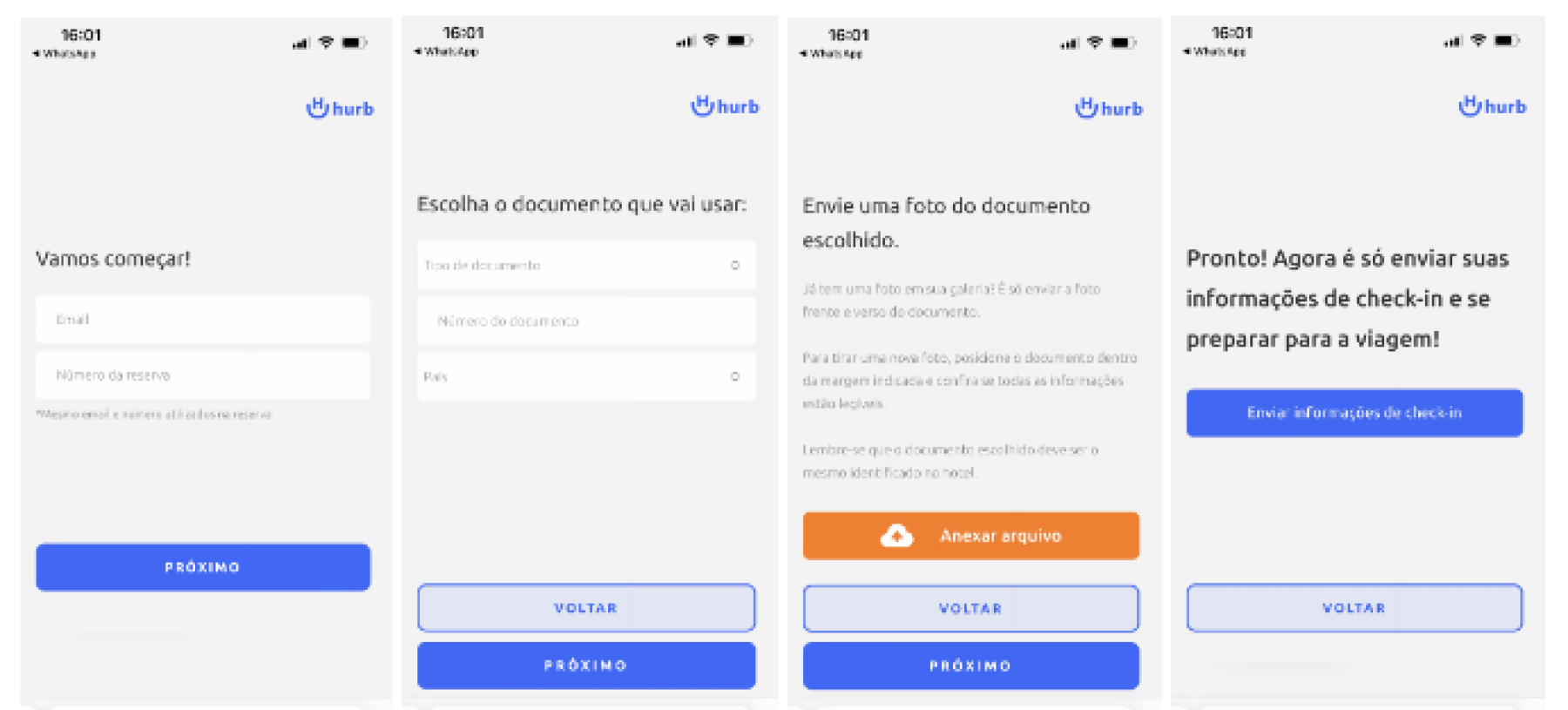Software to improve the guest experience during the check-in and facilitate the hotelier's work.
The solution allows the user to send the necessary information for check-in digitally, before arriving at the hotel, and taking advantage of the information already registered in the Hurb base.
In this way, Hurb would have a pre-registration of the users, allowing information to be sent and
issuing National Guest Registration Form automatically. With the digitized process, it avoids queues at the reception (mainly corporate groups), in addition to streamlining the check-in process.
Challenges
The check-in experience, in most hotels, is a bureaucratic process, requiring a very extensive form, which is mandatory by the Ministry of Tourism. This makes the process time consuming and can generate queues, especially when in corporate groups, and right at the moment when the guest is tired after his trip and just wants to get to the room. This can bring great dissatisfaction to the guest, being harmful to the hotel.
What we’ve accomplished so far
The project's timeline is divided into four main phases:
1 - Problem identification
-
Queues at reception
-
Retrograde form
-
Lengthy process
-
Not integrated with other hotel systems
2 - Research
-
User interview/p>
-
Hotels research
-
Conversations with web check-in companies
-
Conversations with PMS's
3 - Business model and validation of hypotheses
-
Business Model Canvas
-
Headquarters Importance x Evidence
4 - Validation with the hotels
-
Landing page
-
Interviews with hotels
-
Lengthy process
-
Product not validated
Some interfaces of the prototype to validate:
Lost opportunity cost
In February 2022, when we started researching Fast Checkin, a few companies worked with online check-in, so it seemed like an opportunity for us to get ahead of the market.
However, the team was still being created at Labs, and we needed all the necessary professionals, making the project move slower.
During this period, we focused on market research to understand the existing problems and user needs. We got in touch with companies that carried out online check-in and with several PMS's, we spoke with several Hurb internal teams, and we did research in partner hotels.
From the middle to the end of last year, when the team was increasing, the market was already much more consolidated in this area, and the number of companies that started to carry out online check-in doubled (if not tripled). From this, we tried to adapt to the new scenario, researching other possible solutions to improve the guest experience at check-in.
It is worth mentioning, for the most part, the PMS's that hotels are already using developed this online check-in module, creating great difficulty competing with this product. We then did one last validation to understand whether it was worth continuing or ending the project.
We developed a landing page to validate the idea with the hotels and did a final round of interviews. We realized then that we needed more time to start producing our idea, which meant that hotels no longer considered our differentials attractive.
We then decided to complete the project, as we could reallocate the labor and efforts of this initiative to another opportunity with a more significant impact.
Landing page:

Michelle Musafir
Product Designer
Indutrial Design - PUC-RJ - Pontifical Catholic University of Rio de Janeiro

Caio Santos
Research and development engineer
Nuclear Engineering - UFRJ - Federal University of Rio de Janeiro

Cauê Melo
Software Engineer
Information Systems - Unirio - Federal University of the State of Rio de Janeiro

Rayssa Vanucci
Operation Manager
International Relations - PUC-MG - Pontifical Catholic University of Minas Gerais



